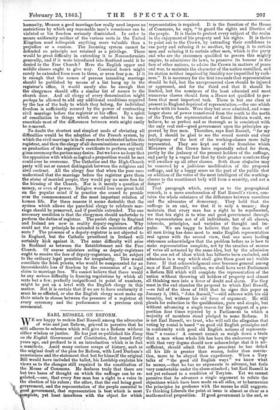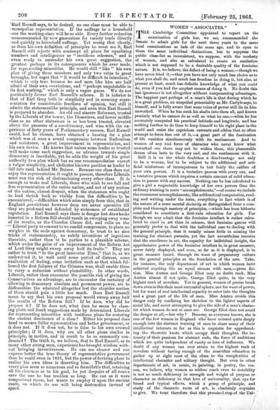EARL RUSSELL ON REFORM.
"VVE are happy to reckem Earl Russell among the advocates of wise and just Reform, grieved to perceive that he still adheres to schemes which will give us a Reform without either wisdom or justice. He has just re-published his Essay on the English Government and Constitution, first issued forty years ago, and prefixed to it an introduction which is in fact a manifesto. Amid many curious scraps of history, such as the original draft of the plan for Reform, with Lord Durham's annotations and the statement that but for himself the original Bill would have included the ballot, his Lordship explains his views as to the changes still required in the constitution of the House of Commons. He declares truly that there are but two bases of thought on which the suffrage can be re- gulated,—one, that every free man has a right to a voice in the election of his rulers; - the other, that the end being good 'Ivgovernment, and the representation of the people essential to good government, that representation is best which is most complete, yet least interferes with the object for which representation is required. It is the function of the House of Commons, he says, "to guard the rights and liberties of the people. It is theirs to protect every subject of the realm in the enjoyment of his property and his rights. It is theirs to point out to the Crown, by extending their confidence to one party and refusing it to another, by giving it to certain men and refusing it to certain other men, which is the party and who are the statesmen qualified to govern this mighty empire, to administer its laws, to preserve its honour in the face of other nations, to advise the Crown in matters of peace and war, to maintain the character of the nation unsullied, and its station neither impaired by timidity nor imperilled by rash- ness." It is necessary for the first two ends that representation should be full, lest the unrepresented class should be injured or oppressed, and for the third end that it should be.
limited, lest the nominees of the least educated and most numerous classes should form a House not qualified to per- form that most important task. There is but one class at present in England deprived of representation,—the one which works with its hands. Were they but once admitted, and some larger share of power transferred from the south to the north of the Trent, the representation of Great Britain would, we believe, be as perfect and as thorough as is consistent with the only real end—good government upon the principles ap- proved by free men. Therefore, says Earl Russell, "for my part, I should be glad to see the sound morals and clear intelligence of the best of the working-classes more fully represented. They are kept out of the franchise which Ministers of the Crown have repeatedly asked for them, partly by the jealousy of the present holders of the suffrage, and partly by a vague fear that by their greater numbers they will swallow up all other classes. Both those obatacles may be removed by a judicious modification of the proposed suffrage, and by a happy sense on the part of the public that an addition of the votes of the most intelligent of the working- classes to the constituent body will form a security, and not a danger."
That paragraph which, except as to the geographical remark, is a mere condensation of Earl Russell's views, con- tains the whole substance of the difference between ourselves and the advocates of democracy. They hold that the suffrage is an end, we that it is only a means ; they maintain that every man has a right to be represented, we that his right is to wise and good government through the representation not of all individuals, but of all classes, interests, principles, and varieties of thought and im- pulse. We are happy to believe that the man who of all men living has done most to make English representation real agrees with the second view, that one more leading statesman acknowledges that the problem before us is how to make representation complete, not by the creation of masses of votes all actuated by the same idea, but by the admission of the one set of ideas which has hitherto been excluded, and admission in a way which shall give them great and visible force. If that acknowledgment once becomes general among men of Earl Russell's calibre, we shall have next Parliament a Reform Bill which will complete the representation of the nation without throwing all holders of property and almost all thinking men into a fever of doubt and alarm. For they must in the end abandon the proposal to which Earl Russell, —so full of the ideas of 1831 that he signs this paper on January 3, 1865, "John Russell,"—still adheres with his old tenacity, but without his old force of argument. He still pleads for reduction in the qualification, pure and simple, but without advancing a single reason for his support of a pro- position four times rejected by a Parliament in which a majority of members stand pledged to some Reform. It is not Earl Russell, we trust, who will call the allegation that voting by rental is based "on good old English principles and in conformity with good old English notions of representa- tion" a reason? A coronet cannot so weigh down a brain that a man whose whole life has been the endeavour to cope with that very dogma should now acknowledge that it is all- sufficient, should admit that the precedent he has defied all his life is greater than reason, holier than convic- tion, more to be obeyed than expediency. When a Tory talks of "the good old English ways" we know what he means,—that he has no arguments to advance, but feels very comfortable under the abuse attacked ; but Earl Russell is not yet reduced to a condition of Toryism. Yet we cannot perceive that he advances a single argument to refute the objections which have been made on all sides, or to harmonize the principles he professes with the means he still suggests. To thinking Liberals the point at issue is almost as clear as a mathematical proposition. If good government is the end, as
Earl Russell says, to be desired, no one class must be able to monopolize representation. If the suffrage be a household -one the working-class will be so able. Every further reduction
unaccompanied by new guarantees for variety tends directly And quickly to household suffrage. Yet seeing that clearly, - as from his own definition of principles he .must see it, Earl Russell still rejects with contempt all plans for equalizing
-numbers and intelligences as "invidious schemes," and is even ready to surrender his own great suggestion, the greatest perhaps in its consequences which he ever made, for representing minorities. He would still "like " his own plan of giving three members and only two votes to great boroughs, but urges that "it would be difficult to introduce," --which is only true because he and men like him are half - afraid of their own convictions, and "perhaps unpalatable in -its first working," which is only a vague guess. We do not particularly favour Earl Russell's scheme. It is inferior to that of Earl Grey both in simplicity and in securing repre- sentation for considerable fractions of opinion, but still it -admits the statesmanlike principle, and even this Earl Russell is prepared to abandon. An old and sincere Reformer, trusted by the Liberals of the town', the Dissenters, and lower middle -class as no other statesman is or has been trusted, elevated above the pressure of a constituency, and wise with the ex- perience of forty years of Parliamentary success, Earl Russell could, had he chosen, have obtained a hearing for a plan -which was at once a sound compromise between Radicalism and resistance, a great improvement in representation, and this own device. He knows that unless some leader so trusted make some such suggestion, an advance towards simple democracy is inevitable, yet he adds the weight of his great authority to 41 plan which has no one recommendation except
• a vulgar simplicity, and abdicates his own position as leader to -fall into rank behind Mr. Baines. Because one class does not enjoy the representation it ought to possess, therefore Liberals must run the risk of disfranchising every other class. It is -enough to make real Liberals, those who wish to see full and Tree representation of the entire nation, and not of any section --of the nation, almost despair, when the statesmen who ought • to lead shrink back so visibly from the difficulties to be -encountered,--difficulties which arise simply from this, that in England *convictions however deep are never operative till they are professed and defended by statesmen of established -reputation. Earl Russell says there is danger lest drawbacks inserted in a Reform Bill should result in sweeping away some of its results, as the Chandos Clause did, and calls on the -4' Liberal party to consent to no candid compromise, to place no weights in the scale against democracy, to trust to no nice tricks of statesmanship, no subtle inventions of ingenious theorists, rather than to be parties to a plausible scheme, -which under the guise of an improvement of the Reform Act of Lord Grey might sweep away half its fruits." They are rather to trust "to the great innovator Time," that is, as we understand it, to wait until some period of distress, some exaltation of feeling, some irritation such as that which fol- lowed the first failures of the Crimean war, shall enable them to carry a reduction without plausibility. In other words, Liberals, rather than encounter the possible risk of giving the Conservatives an advantage, are to encounter the certainty of -Allowing to democracy absolute and permanent power, are to disfranchise the educated altogether lest the stupider section of them should gain a little too much. Does Earl Russell mean to say that his own proposal would sweep away half the results of the Reform Bill ? If he does, why did he propose it? If he does not, what does he mean by class- ing plain and frank suggestions made by determined Liberals ler representing minorities with insidious plans for restoring the ancient dominance of a class? Either his proposal does tend to secure fuller representation and better government, or it does not. If it does not, he is false to his own avowed principles ; if it does, why are all other plans similar in principle, in motive, and in result to be so summarily con- demned ? The truth is, we believe, that to Earl Russell, as to many other strong men, experience has brought wisdom with- out bringing inventiveness. He can see clearer and can -express better the true theory of representative government than he could even in 1831, but the power of devising plans to realize his own ideas is deserting him. The difficulties to every plan seem so numerous and so formidable that, retaining all his clearness as to his goal, he yet despairs of all routes save the one he has trodden so long. He can as it were comprehend steam, but wants to employ it upon the ancient roads, on which its use will bring destruction instead of speed.



































 Previous page
Previous page